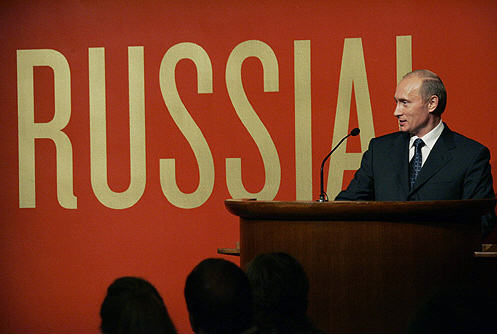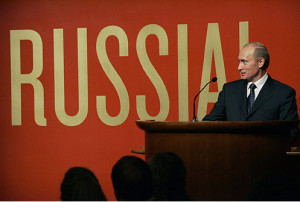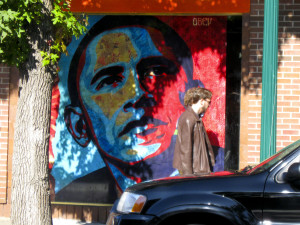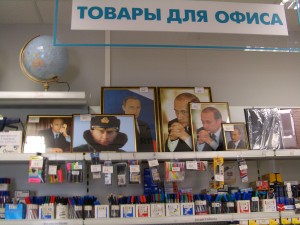Personality Cults and Democracy: Is Putin’s Cult of Personality a Concern

Last month Vladimir Putin celebrated his 68th birthday. The Russian leader celebrated the day by scoring goals in a hockey match against former professional players in which he won 15-10 and was subsequently awarded a trophy for the victory and a medal for his contributions to Russian hockey.[1] It might, however, be more appropriate to say that most of Russia celebrated the day. Indeed, Putin is a very popular figure in Russian politics who enjoys an increasingly high approval rating, often described as a personality cult by the West.[2] Certainly the image that surrounds his person surpasses him at times and has led people to make comparisons to the personality cult of Stalin. There is a chance that in concerning ourselves with the existence of Putin’s personality cult, we may be overemphasizing certain facts and downplaying others in an effort to distance ourselves with the similarities that exist between Russia and the West.

The term “personality cult” has a very negative connotation and, in the context of Russia, is typically associated with Stalinism, the repression of civil liberties, and the consolidation of state control. The notion of building and maintaining a personality cult (more specifically, Stalinism) was famously renounced by Soviet leader Nikita Khrushchev in his “Secret Speech”, published only much later during Gorbachev’s leadership.[3] Emphasizing that the error of the personality cult of Stalin was that it falsely attributed success of the nation to the almost godlike character of the leader and that the harsh methods of maintaining the cult of personality were reprehensible, Khrushchev certainly presented a clear picture of the egregious nature of personality cults.
To speak of a personality cult today with respect to Putin raises serious concerns, yet there may be less nefarious reasons for Putin’s popularity in Russia. A hard look at Putin’s time in office shows that his government was very successful in transforming Russia’s economy. Under Putin, Russian GDP exploded exponentially and only experienced a brief dip in 2010 when former president Medvedev was in power.[4] Admittedly, there are questions of whether the changes to Russia’s economy were truly Putin’s doing or if the reform policies of Yeltsin allowed Putin to enjoy success, but Putin’s popularity throughout his time as President is clear regardless.[5] When polled, most Russians said that they felt both that Putin was successfully resolving Russia’s problems and that he sincerely wished to improve the lives of Russians.[6] There is a real sense in Russia that Putin not only is an effective leader but that he is the best leader. Additionally, there is an air of charisma that surrounds him as exemplified from the many macho photographs of him, to pop songs about his moral upstanding and soberness (a hit at the drunken stupor of Yeltsin), to the rap track from Russian artist Тимати (Timati) that was released on Putin’s birthday called Лучший друг (Best friend).[7][8][9] Seeing young adults dance in Putin masks and sing his praises, who would doubt that Putin is a “крутой супергерой” (cool superhero)?

In some respects, the popularity of Putin can be compared to that of US President Barack Obama. Like Putin, Obama is an incredibly charismatic leader. His 2008 presidential campaign led many to place an unusual amount of confidence in how successful his presidency would be in transforming America from the imperial portrayal inherited from the last years of the presidency of G.W. Bush.[10] Like Putin, Obama’s public image is very good. From presidential fist-bumps, to collaborations with internet sites like Buzzfeed, Obama is one of the most relatable and charming leaders the US has had in decades.[11] Does this charisma and popularity translate to an Obama personality cult? Not clearly. Certainly not to the same degree as Putin. Considering the negative aspect of personality cults as coercively building the strength of the regime through the repression of liberties in an idealized leadership, Obama certainly fails on that account as his presidency has turned out to be viewed largely as a disappointment. His approval rating largely mirrors that of his widely disliked predecessor and few in America feel that his leadership is leading America in the right direction.[12][13]
There are two factors that may explain the difference between Putin and Obama’s personality cults. The first is that the power of the US president is checked by term limits. It makes sense for a president in the US to try to remain popular in the eyes of the people, but there is little sense in devoting lots of time and resources to building an idealized appearance if it will only be useful for a maximum of eight years. The Russian president is bound by no such limits. The second, and more important factor, is the fact that media in the Russian Federation is very suppressed.[14] In a country where nearly 90% of the population receives their information from television, the three biggest television stations in Russia are controlled by the government.[15] Does this mean that content creators like Тимати are commissioned by Putin to promote a positive image of the president? Not necessarily. It does, however, mean that a government-controlled media is inclined to project a positive image of the president. The US government enjoys no such control over media and, despite any claims about certain media outlets, media in the US remains very free.[16]

A personality cult of Putin suggests that the current appeal of Putin is a return to the totalitarian days of old. Yet this is would be a mistaken conclusion. It is very true that media in Russia today is not as free as in the West and that this is similar to the tight repression of media during Stalin’s reign, but the similarities end there. The personality cult of Stalin was coercive and was used to invoke fear in the people. Putin’s popularity is more voluntary and inspires Russians to be proud of their return to prominence on the global stage and builds enthusiasm. Putin has little control over the Internet though some sanction efforts have been put in place.[17] Similarly, though Putin memorabilia (of all kinds) is sold, it is done through a free market economy. People do not buy Putin memorabilia because they have no other options or because they fear sanctions, they do so freely.
There is sufficient evidence to suggest that, at least in part, the enthusiasm for Putin genuinely comes from the citizens. Currently, roughly a quarter of Russians believe that there is a personality cult surrounding Putin and another 30% believe that the preconditions for such a cult to appear exist.[18] Though the number of Russians willing to answer that a personality cult of Putin exists has grown over the years, there is still a sizable portion that denies its existence.[19] The growing realization of political actors in both Russia and the US (indeed, in the world as a whole) of the power of media means that efforts will be taken to present a likable self-image. To what extent this can be called a personality cult of the likes of figures like Stalin is less clear. Conflating the popularity of Putin with a personality cult would certainly be a grave error. Is the popularity of Putin a pressing concern for the west? Only to the extent that it speaks of the need for political reform in the Russian Federation.
[1] Time: This is how Vladimir Putin celebrated his birthday
[2] Levada Center: Putin approval rating
[3] Nikita Khrushchev – On the Cult of Personality and its Consequences
[4] Center for Strategic International Studies
[5] Peterson Institute for International Economics: An assessment of Putin’s economic policy
[6] Levenda Center: Perceptions of Vladimir Putin
[7] Reuters: Putin’s macho image
[8] Youtube: Поющие вместе – Такого как Путин
[9] Youtube: Саша Чест feat. Тимати – Лучший друг
[10] Economist: The Obama cult
[11] Buzzfeed: Things everybody does but doesn’t talk about, featuring President Obama
[12] Real Clear Politics: Obama/Bush job approval
[13] Rasmussen Reports: Right direction or wrong track
[15] The Moscow Times: Russians consider TV the most trustworthy news source
[16] Freedom House: United States
[17] Arstechnica: Russia’s Internet censor reminds citizens that some memes are illegal
[18] Lenta: Четверть россиян заметила культ личности Путина
[19] Ibid.
